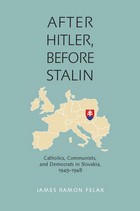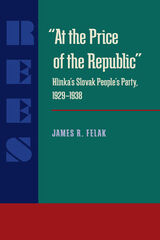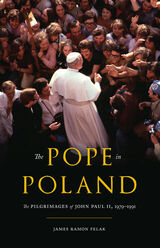
Felak opens by providing a background on pre-war and wartime Slovak politics, notably the rise of Slovak Catholic nationalism and Slovakia's alignment with Nazi Germany during World War II. He then describes the union formed in the famed “April Agreement” of 1946 between the Democratic Party and Catholics that guaranteed a landslide victory for the Democrats and insured a position for Catholics in the new regime. Felak views other major political events of the period, including: the 1947 Czechoslovak war crimes trial of Father Jozef Tiso; education policy; the treatment of the Hungarian minority; the trumped-up “anti-state conspiracy” movement led by police in the Fall of 1947; and the subsequent Communist putsch.
Through extensive research in Slovak national archives, including those of the Democratic and Communist parties, After Hitler, Before Stalin assembles a comprehensive study of the predominant political forces and events of this tumultuous period and the complex motivations behind them.

Slovak nationalist sentiment has been a constant presence in the history of Czechoslovakia, coming to head in the torrent of nationalism that resulted in the dissolution of the Republic on January 1, 1993. James Felak examines a parallel episode in the 1930s with Slovak nationalists achieved autonomy for Slovakia-but “at the price” of the loss of East Central Europe's only parliamentary democracy and the strengthening of Nazi power.
The tensions between Czechs and Slovaks date back to the creation of Czechoslovakia in 1918. Slovaks, who differed sharply in political tradition, social and economic development, and culture, and resented being governed by a centralized administration run from the Czech capital of Prague, formed the Slovak People's Party, led by Roman Catholic priest Ankrej Hlinka. Drawing heavily on Czech and Slovak archives, Felak provides a balanced history of the party, offering unprecedented insight into intraparty factionalism and behind-the-scenes maneuvering surrounding SSP's policy decisions.

READERS
Browse our collection.
PUBLISHERS
See BiblioVault's publisher services.
STUDENT SERVICES
Files for college accessibility offices.
UChicago Accessibility Resources
home | accessibility | search | about | contact us
BiblioVault ® 2001 - 2024
The University of Chicago Press









